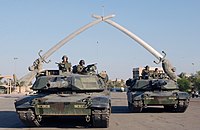| Part of a series on |
| War (outline) |
|---|
 |


Military occupation, also called belligerent occupation or simply occupation, is temporary hostile control exerted by a ruling power's military apparatus over a sovereign territory that is outside of the legal boundaries of that ruling power's own sovereign territory.[1][2][3][4] The controlled territory is called occupied territory, and the ruling power is called the occupant.[5] Occupation's intended temporary nature distinguishes it from annexation and colonialism.[4][6] The occupant often establishes military rule to facilitate administration of the occupied territory, though this is not a necessary characteristic of occupation.[7]
The rules of occupation are delineated in various international agreements—primarily the Hague Convention of 1907, the Geneva Conventions, and also by long-established state practice. The relevant international conventions, the International Committee of the Red Cross, and various treaties by military scholars provide guidelines on topics concerning the rights and duties of the occupying power, the protection of civilians, the treatment of prisoners of war, the coordination of relief efforts, the issuance of travel documents, the property rights of the populace, the handling of cultural and art objects, the management of refugees, and other concerns that are highest in importance both before and after the cessation of hostilities during an armed conflict. A country that engages in a military occupation and violates internationally agreed-upon norms runs the risk of censure, criticism, or condemnation. In the contemporary era, the practices of occupations have largely become a part of customary international law, and form a part of the law of war.
Since World War II and the establishment of the United Nations, it has been common practice in international law for occupied territory to continue to be widely recognized as occupied in cases where the occupant attempts to alter—with or without support or recognition from other powers—the expected temporary duration of the territory's established power structure, namely by making it permanent through annexation (formal or otherwise) and refusing to recognize itself as an occupant. Additionally, the question of whether a territory is occupied or not becomes especially controversial if two or more powers disagree with each other on that territory's status; such disputes often serve as the basis for armed conflicts in and of themselves.
- ^ Bracka, J. (2021). Transitional Justice for Israel/Palestine: Truth-Telling and Empathy in Ongoing Conflict. Springer series in transitional justice. Springer International Publishing AG. ISBN 978-3-030-89435-1.
Today, the widely accepted definition of occupation is 'the effective control of a power (be it one or more states or an international organization, such as the United Nations) over a territory to which that power has no sovereign title, without the volition of the sovereign of that territory'
- ^ Roberts, Adam (1990). "Prolonged Military Occupation: The Israeli-Occupied Territories Since 1967". American Journal of International Law. 84 (1). Cambridge University Press (CUP): 44–103. doi:10.2307/2203016. ISSN 0002-9300. JSTOR 2203016. S2CID 145514740.
- ^ Eyal Benvenisti. The international law of occupation. Princeton University Press, 2004. ISBN 978-0-691-12130-7, p. 43
- ^ a b Edelstein, David M. (2004). "Occupational Hazards: Why Military Occupations Succeed or Fail". International Security. 29 (1): 52. doi:10.1162/0162288041762913. ISSN 0162-2889. JSTOR 4137547. S2CID 57571525.
The intended temporary duration of occupation distinguishes it from both annexation and colonialism.
- ^ Fabre, Cécile. "Living with the enemy: the ethics of belligerent occupation" (PDF). Archived from the original (PDF) on 2018-11-30. Retrieved 2018-11-30.
- ^ Stirk, Peter (2009). The Politics of Military Occupation. Edinburgh University Press. p. 44. ISBN 9780748636716.
The significance of the temporary nature of military occupation is that it brings about no change of allegiance. Military government remains an alien government whether of short or long duration, though prolonged occupation may encourage the occupying power to change military occupation into something else, namely annexation
- ^ Roberts, Adam (1985). "What is a Military Occupation?". British Yearbook of International Law. 55: 249–305. doi:10.1093/bybil/55.1.249.